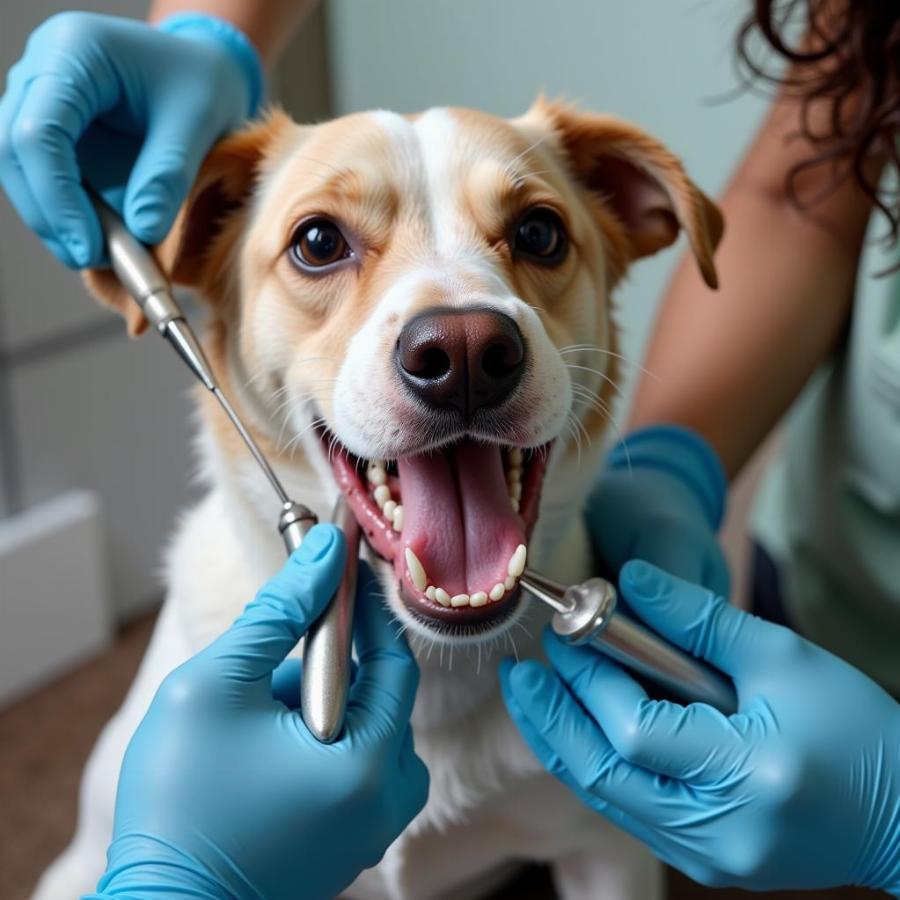Dog teeth calculus, also known as tartar, is a common dental problem that can lead to more serious health issues if left untreated. This hardened plaque buildup on your furry friend’s teeth can cause bad breath, gum disease, and even tooth loss.
Understanding dog teeth calculus and taking proactive steps to manage it is crucial for maintaining your canine companion’s overall health and well-being. This comprehensive guide will delve into the causes, symptoms, and solutions for dog teeth calculus, empowering you to keep those pearly whites sparkling.
What is Dog Teeth Calculus?
Dog teeth calculus is a hard, yellowish-brown deposit that forms on the teeth, primarily composed of mineralized plaque. Plaque, a sticky film teeming with bacteria, constantly forms on your dog’s teeth. When plaque isn’t regularly removed through brushing, it hardens into calculus, also known as tartar.
Causes of Dog Teeth Calculus
Several factors contribute to the formation of dog teeth calculus:
- Poor Oral Hygiene: Infrequent or improper brushing allows plaque to accumulate and solidify.
- Diet: Soft, sticky foods tend to adhere to teeth, promoting plaque formation.
- Breed Predisposition: Smaller breeds and those with crowded teeth are more susceptible.
- Age: Calculus buildup is more common in senior dogs.
- Other Health Conditions: Certain medical conditions can increase a dog’s susceptibility to dental issues.
Recognizing the Signs: Symptoms of Dog Teeth Calculus
Detecting dog teeth calculus early is key to preventing more severe dental problems. Be on the lookout for these common signs:
- Visible Tartar: Yellow or brown buildup on the teeth, especially along the gum line.
- Bad Breath: Persistent bad breath, often described as a foul odor.
- Red or Swollen Gums: Inflammation of the gums (gingivitis) can be an early indicator.
- Bleeding Gums: Gums that bleed easily, especially during brushing or chewing.
- Difficulty Eating: Pain or discomfort while eating can signify advanced dental disease.
Preventing Dog Teeth Calculus: A Proactive Approach
Preventing dog teeth calculus is far more effective and less costly than addressing advanced dental problems. Here are essential preventative measures:
- Daily Brushing: Just like humans, dogs benefit greatly from daily teeth brushing. Use a dog-specific toothbrush and toothpaste.
- Dental Chews and Treats: Provide dental chews and treats designed to promote chewing action and reduce plaque buildup.
- Regular Veterinary Dental Checkups: Schedule professional dental cleanings as recommended by your veterinarian.
- Diet Considerations: Opt for dry kibble over wet food, as dry food can help scrape away plaque.
- Dental Water Additives: Consider adding a dental water additive to your dog’s water bowl to help control plaque and bacteria.
Addressing Dog Teeth Calculus: Removal and Treatment
If your dog has already developed calculus, professional veterinary intervention is necessary:
- Professional Dental Cleaning: This procedure, performed under anesthesia, involves scaling and polishing to remove plaque and calculus.
- Extractions: In severe cases where teeth are loose or significantly damaged, extractions may be necessary.
- Home Care After Cleaning: Following a professional cleaning, maintain your veterinarian’s recommended home care routine to prevent future buildup.
Expert Insight: Dr. Emily Carter, DVM
“Regular dental care is just as vital for dogs as it is for humans,” advises Dr. Emily Carter, a seasoned veterinarian with over 15 years of experience. “Neglecting your dog’s dental hygiene can lead to painful infections, tooth loss, and even impact their overall health. “
Frequently Asked Questions (FAQs)
Q: Can I remove my dog’s calculus at home?
A: Attempting to remove your dog’s calculus at home can be dangerous and cause injury. Always consult with a veterinarian for professional dental cleaning.
Q: How often does my dog need professional teeth cleaning?
A: The frequency of professional cleanings varies depending on your dog’s breed, age, and overall oral health. Your veterinarian can recommend an appropriate schedule.
Q: What are the long-term risks of untreated dog teeth calculus?
A: Untreated calculus can lead to gum disease (periodontitis), tooth loss, and even spread bacteria to other organs, potentially causing heart, liver, or kidney problems.
 Dog Undergoing Dental Cleaning
Dog Undergoing Dental Cleaning
Keep Those Tails Wagging: Prioritize Dog Dental Health
By understanding the causes, symptoms, and solutions for dog teeth calculus, you can take proactive steps to protect your furry friend’s smile and overall well-being. Remember that prevention is key, and establishing a solid dental care routine is an investment in your dog’s long-term health.
Explore More Dog Dental Care Tips
- Learn more about plaque off powder dogs and their effectiveness in reducing tartar buildup.
- Discover effective methods to get rid of dog tartar and maintain optimal oral hygiene.
- Find out how to remove hardened plaque from dog’s teeth through professional veterinary care.
- Explore comprehensive guides on removing tartar on dogs teeth to ensure your furry friend’s dental health.
Beaut Dogs: Your Trusted Partner in Dog Care
Beaut Dogs is your ultimate resource for all things dog-related, offering expert advice, informative articles, and a passion for canine companions. We are dedicated to providing dog owners with reliable information and resources to ensure the health, happiness, and well-being of their beloved pets.
For personalized guidance and support, contact our team at [email protected]. We’re here to help you navigate the world of dog ownership and provide tailored solutions for your furry friend’s needs.